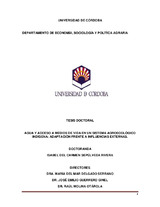Agua y acceso a medios de vida en un sistema agroecológico indígena: adaptación frente a influencias externas
Autor
Sepúlveda Rivera, Isabel del Carmen
Director/es
Delgado Serrano, María del MarGuerrero Ginel, J.E.
Molina Otárola, Raúl
Editor
Universidad de Córdoba, UCOPressFecha
2016Materia
AguaManejo indígena
Sistema agroecológico
Medios de vida
Adaptabilidad
Water
Indigenous management
Agro-ecological System
Livelihoods
Adaptability
METS:
Mostrar el registro METSPREMIS:
Mostrar el registro PREMISMetadatos
Mostrar el registro completo del ítemResumen
Las comunidades indígenas atacameñas en el norte de Chile, desde hace más de
9000 años, han sido capaces de construir redes sociales y estrategias de medios
de vida, en unas complejas condiciones de desierto extremo. Actualmente, la
influencia de diversos factores: cambio climático, globalización, disminución de los
recursos hídricos, cambios en la infraestructura del riego, políticas institucionales,
minería y turismo, entre otros, introducen conflictos en cuanto al acceso, uso y
distribución del agua. Frente a esta situación, los atacameños han ido adaptando
sus prácticas culturales de uso y gestión del agua, a fin de mantener la seguridad
del riego y sostener sus cultivos tradicionales, en un sistema agroecológico que se
basa en el aprovechamiento de diversos recursos complementarios. Estas
transformaciones, llevan a la hipótesis de que la gestión del agua, sostenida en la
cosmovisión de los atacameños, contiene respuestas de adaptación eficientes,
para transformar influencias externas, en activos de medios de vida y de desarrollo
sostenible. De tal manera que el principal objetivo, es valorar estas estrategias
desde una comprensión múltiple, que incluye desde aspectos políticos,
económicos, ambientales hasta los socio culturales. Indigenous communities in the north of Chile, for over 9,000 years, have been able
to construct social networks and strategies of livelihood resources in very extreme
and complex desert conditions. In the present, external factors such as climate
change, globalization, decrease of water resources, changes in the irrigation
infrastructure, institutional policies, mining and tourism, are causing conflicts
regarding access to and use and distribution of water. Faced with this situation the
Atacameños have been adapting their cultural practices of water use and
management, in order to ensure irrigation and to sustain their farming of traditional
crops within an agro-ecological system based on the use of a variety of non-core
resources. These transformations lead to the hypothesis that water management,
generated from the cosmovision of the atacameños, contains efficient adaptation
responses, where external influences are turned into assets for livelihood and
sustainable development. The main objective of this dissertation is the evaluation
of these strategies from a multiple interpretation, ranging from political, economic,
environmental and sociocultural aspects.

